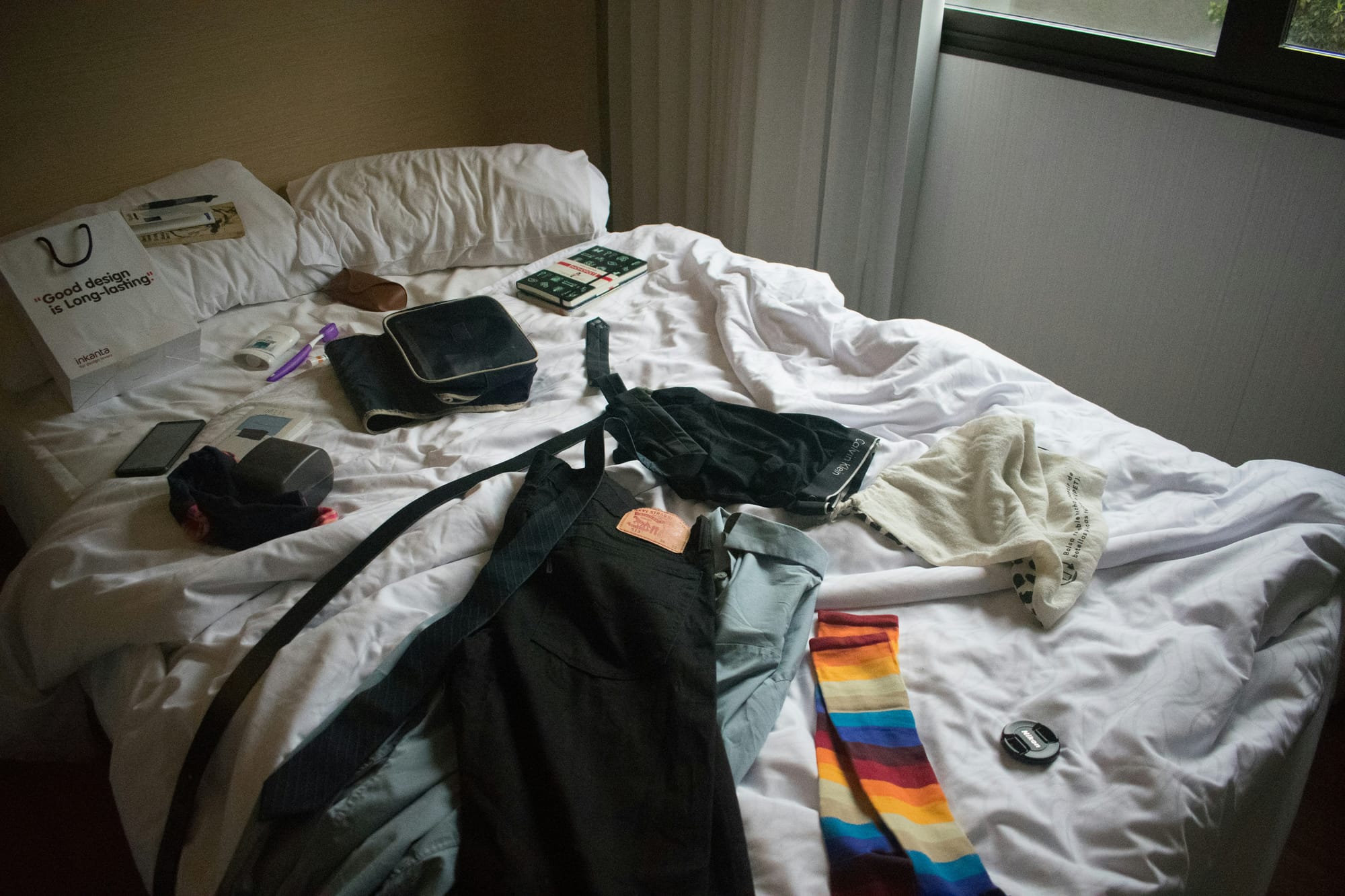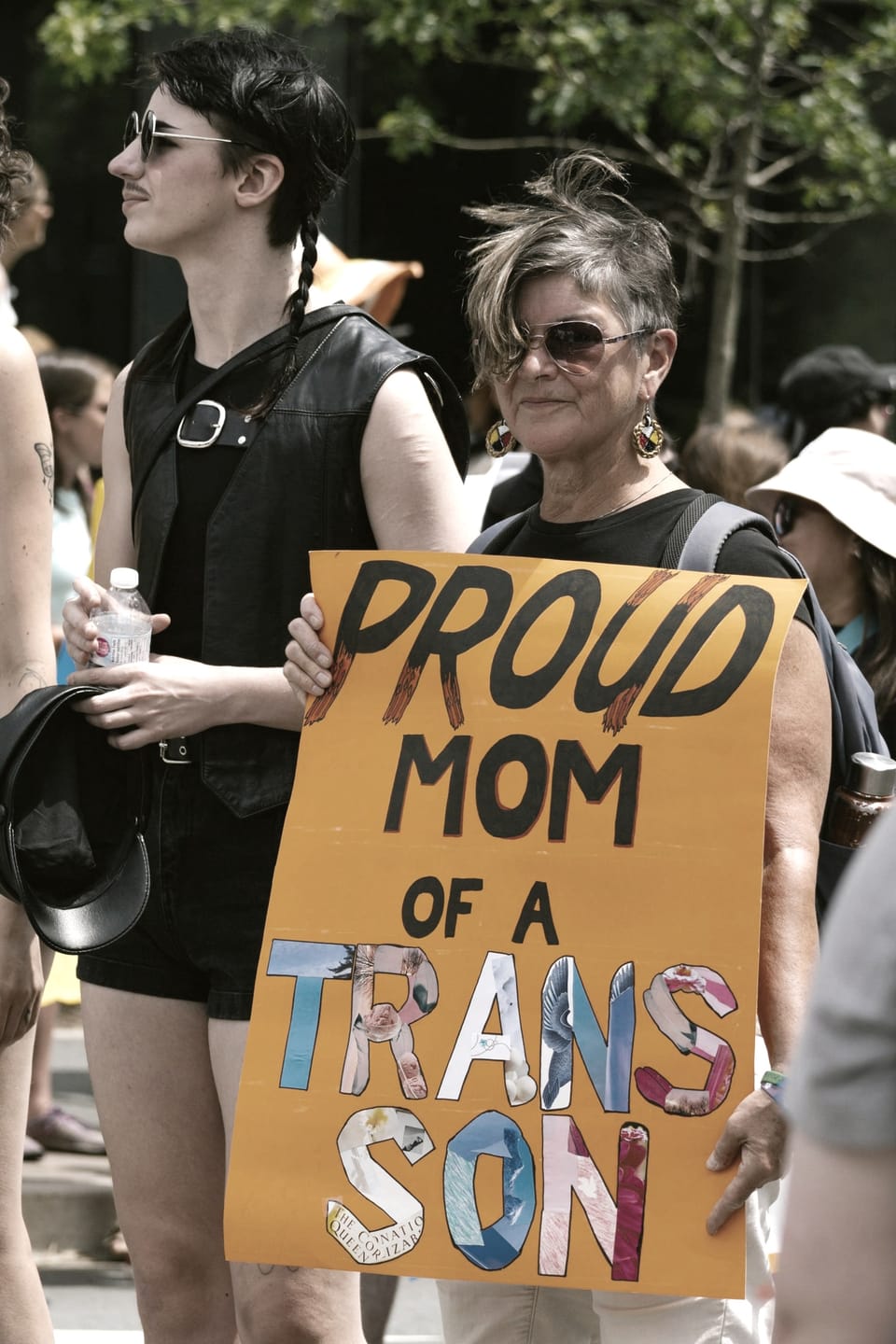Peace Amid Mental Illness: Guest Writer Paulina Ferios
Like everyone in our family, our son struggles with mental health issues. But being trans is NOT one of them. His gender transition has grounded him

Welcome to the latest installment of our Guest Writer series. Thank you, as always, for reading —the Gender Defiant team
Mental health first, gender second was my mantra when our 12-year-old AFAB (assigned female at birth) child entered puberty during the Covid-19 lockdown. The four of us—me, my husband, our twin girls—were squeezed into a 450-square-foot cottage in northern California while our house was being built. Living in close quarters with tweens, all of us on constant, separate, simultaneous Zooms, was the level of chaos you might imagine.
Our daughter Charlotte had without comment hung a trans pride flag on the ceiling of her sleeping loft, but she had always been a maximalist, always impulsive, obsessive. We joked that if she’d been allowed to get tattoos as a young child, she would today regret being covered in Super Why, Spider-Man, Thomas the Tank Engine, the Beatles. She spent days making birds out of wadded-up paper, then a comic about worms who hugged, then would run out of the room, leaving behind a trail of disinterest.
Charlotte was mercurial, my husband said. Quick to cry, then laugh. The trans flag seemed a bit of temporary static in her field of static. Nothing remarkable. The other middle-schoolers were wrestling the gender-binary dinosaur too, which I thought was both healthy and emblematic of Gen Z. Good for them, I thought. And Charlotte had been androgynous, at least in my eyes, since she’d popped out. Her twin seemed to have inherited all of the girly genes.
So, amid the upheaval, things were more or less steady until the night we found Charlotte in the cottage’s sole bathroom, bleeding from a cut she’d self-administered, sobbing, half-naked. Suddenly we realized how comfortable we’d been in what turned out to be complacency. Something was really, really wrong.
Measured, settled
Doctor’s appointments followed. An SSRI was prescribed. Charlotte’s diagnosis was somewhere in the Venn diagram linking ADHD, major depression, and OCD. And then, in the midst of all that, she said, almost casually, “I think I might be trans.”
Mental health first, gender second, I told myself. We waited to see how Charlotte would do on the medication: I was convinced that whatever came out of her mind when it didn’t have to focus on just making it through the day would be more measured, more settled. “So how are you feeling about the trans stuff now?” I asked after a few months of better sleep and appetite, less yelling at her sister, more focus on things like homework. “I was hoping that I could start T soon,” she said. “And I’d like to change my name to Neil.”

Her dad, whose personality is as quicksilver as Charlotte’s, remained skeptical. “It’s trans this week; next week it will be something else,” he said. “I don’t think so,” I said, having noticed that she hadn’t had an emotional outburst in weeks, “I think this is legit.” My husband was clearly exasperated: “It’s a trend right now! Half of her friends have changed their name to a number.”
He wasn’t wrong: most of her crowd was circling the LGBTQ+ world. Plus, like everyone that age, they were renegotiating relationships with their parents and watching their bodies change. The tween years are a lot. In our daughter’s case, besides puberty, mental health was a factor, the pandemic was a factor, and yes, drama was a factor. But the trans question? My husband and I eventually came to feel that it was right to take Charlotte seriously about it. Whatever her gender identity turned out to be, we would accept and support it.
Thus began our journey with our son.
The pronouns took about a year to absorb. Today, half a decade later, our family has forgotten Charlotte. It did for a long time feel like a death, and for a long time a failure, and for a short time, regrettably, a pain in the ass. As parents, we had to separate the memories of our child that were Charlotte-coded from the memories that were soul-coded, and then connect that soul with this new, male person. Who was always the same astonishing being underneath.
Neil helped us with his social transition by doing most of the work. He came out to his middle school principal without telling us first. The principal responded with, “Cool. I’m gay.” Neil began using the boys’ restroom and locker room with kids he’d known since first grade. (Almost no one commented on the switch.) He took control of his testosterone and his therapy. Because he was approaching his gender transition in a measured, thoughtful way—it didn’t seem like something he would later regret—and bravely walking the walk in the world, my husband and I started to relax a bit. Our child was clearly building a life, not sabotaging one.
Prevailing wind
At that point, we re-entered the familiar parental territory of being half-excited and half-terrified about our child’s growing independence. Driving school would come soon, and after that, college. More conventional anxieties.
I wish I could say that that was the end of the story. Mental illness is and has always been a prevailing wind on both sides of our family. All four of us struggle to some degree with it, and Neil did not magically recover, even after his confident gender transition. He will probably always need medication, just like his dad and me. We are trying to normalize that, too.
Neil did not magically recover from his mental health crisis, even after his confident gender transition
What we do not take in stride is the current U.S. presidential administration’s assault on kids like Neil. Our child works so hard to stay well, just like his dad, just like me. But being transgender is not an illness! Quite the opposite: Neil’s transition has been a path toward health.
It also a dangerous path to find yourself on in 2025 America. Last night I worried about whether our healthcare provider will “out” us. Will my husband and I be harassed, doxxed, or prosecuted for letting Neil medically transition? Will the one thing that has brought my son peace be taken from him?
And then my five-foot-two boy, who tapes his breasts under his arms before kickboxing, whose voice has not dropped after three years on T, and who still snuggles into bed with us after a long night of intrusive thoughts, enters the room giggling, and I let out a long breath. He has fucking balls, our kid.
—P.F.
Paulina Ferios is a career academic in northern California. Her background is in poetry, technology, and ethics.
Gender Defiant is entirely reader-supported—produced and edited by a tiny staff. Help us keep publishing real stories about real families with a paid subscription!



